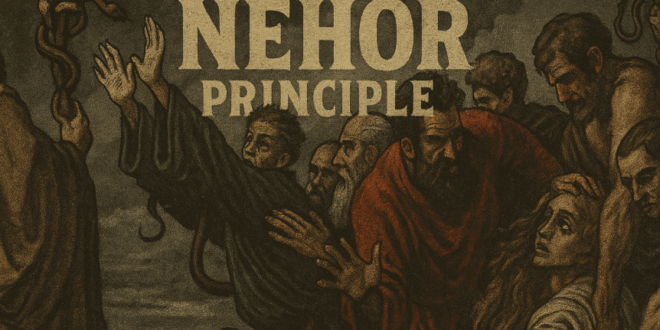Is the Nehor Principle Damning? A Latter-day Saint Reflection on Accountability, Salvation, and the Modern Christian Message
This all started with a simple suggestion from two young missionaries. They invited me to listen to a BYU devotional titled Be 100 Percent Responsible by Lynn G. Robbins. I took their advice. I listened to it in the car with my wife and kids. I appreciated it at face value. It was motivational and direct. But the more I thought about it, the more it planted a deeper question in my heart.
Can anyone be saved, no matter how they live?
That question might sound basic at first. But in today’s world of casual Christianity, cheap grace, and moral relativism, it’s a vital one. Because how we answer it shapes how we live, and more importantly, how we teach our children to live.

In that talk, Elder Robbins referenced a scripture from the Book of Alma, describing what is known as “The Nehor Principle.” Here’s what he said:
The Nehor Principle Denying Justice.
If Satan is not successful in fully separating agency from responsibility, one of his backup schemes is to dull or minimize feelings of responsibility, what we could call the Nehor principle, also found in the book of Alma:
“That all mankind should be saved at the last day, and that they need not fear nor tremble . . . ; for the Lord had created all men, and had also redeemed all men; and, in the end, all men should have eternal life” (Alma 1:4).
That’s not just false doctrine. That’s a lie, and a dangerous one. Yet I am told the principle is a sound one, everywhere I look. It is upsetting, to say the least.
It’s the gospel of ease. The religion of “don’t worry about it.” It preaches comfort without commitment, salvation without sacrifice. It says: Live how you want. Sleep around. Cheat people. Ignore the commandments. And when your body’s giving out and you’ve got one foot in the grave, just say your Hail Marys, toss up a “sorry,” maybe scribble a tithe check, and everything will be fine.
I hear this message far too often, not just from modern Christians, but from people claiming to belong to Christ’s restored Church. I’ve had Latter-day Saints tell me flat out that even serial killers like Jeffrey Dahmer can make it to heaven if they repent in the end and accept Christ.
And yes, I’ve read that Dahmer tried to repent just before he died. I don’t claim to know what’s in his heart, and I’m not here to play judge and jury. But I am here to raise a red flag. People telling me that man made it to heaven, are blinded by the Nehor Principle!
Because if that’s the kind of theology we’re embracing, that you can live like hell and die like a saint, then we are dangerously close to the very deception Alma was warning about.
The Nehor principle is spiritual poison.
It guts the Atonement of its meaning. It strips away the purpose of commandments. It replaces true repentance with spiritual insurance fraud.
The gospel of Jesus Christ is a gospel of repentance, yes. But repentance means change. Real change. Not just guilt. Not just a last-minute prayer. Not just a deathbed confession. It means turning your heart to God, laying aside the natural man, and striving daily to walk in His light.
As the Book of Mormon boldly teaches:
“For we labor diligently to write, to persuade our children, and also our brethren, to believe in Christ, and to be reconciled to God; for we know that it is by grace that we are saved, after all we can do”
(2 Nephi 25:23).
After all we can do.
Not instead of. Not regardless of. But after. That means striving. That means sacrifice. That means doing our best to obey God and endure faithfully, not coasting through life, stacking up sins, and planning to cash in grace like a lottery ticket at the very end.
Grace is real. And it is beautiful. But it is not cheap.
It is not automatic. It does not excuse rebellion disguised as faith. God’s mercy is extended to those who come unto Him with broken hearts and contrite spirits, not those who take pride in their wickedness and see the gospel as a technical escape clause.
So I ask again, what message are we sending to the rising generation if we teach them that God’s love is unconditional but His standards are optional? That agency is sacred but responsibility is flexible? That you can mock God with your lifestyle and then inherit His kingdom with a final breath?
Christ did not sweat blood in Gethsemane and hang on a cross just to make repentance convenient. He did it to satisfy justice, a justice that demands more from us than a last-minute apology. His Atonement is not a spiritual safety net for those planning to fall. It’s a lifeline for those who are trying to rise.
I believe in grace. I believe in repentance. I believe in second chances. But I also believe in consequences. I believe in enduring to the end. I believe in accountability. And I believe the Nehor principle, no matter how sweetly it’s packaged, is a doctrine of devils.
So is it damning?
Yes. Because it denies justice. It mocks the Atonement. It turns sacred covenants into a loophole. And it leads people to trust in false hope instead of real discipleship.
Let the world follow Nehor if they want.
As for me and my house, we will try and serve the Lord the best we can.




